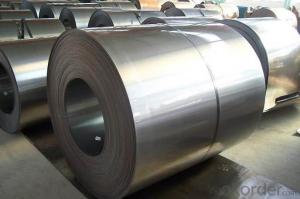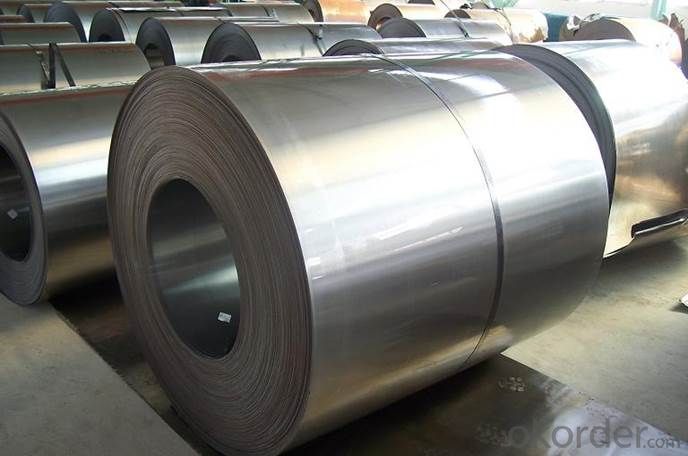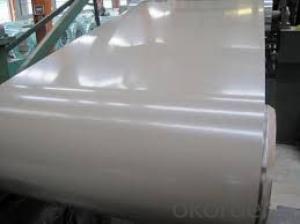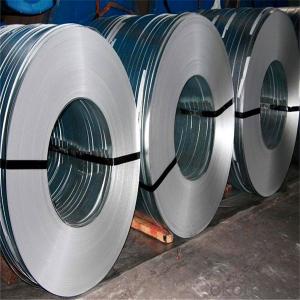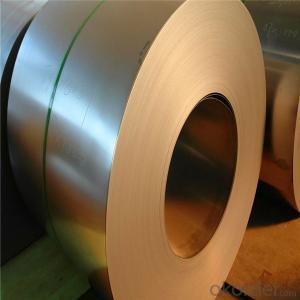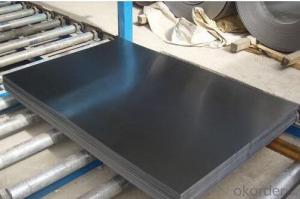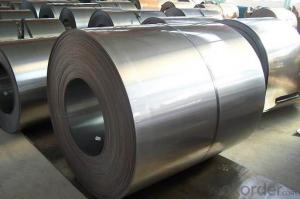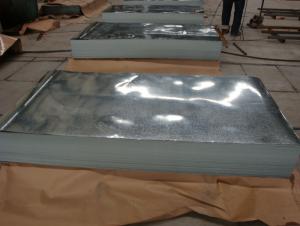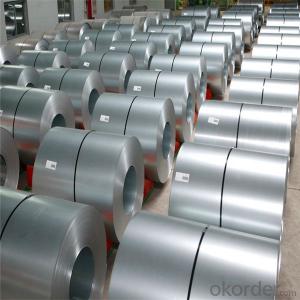Cold Rolled Steel Coils/Sheets, Top Mill's Resource from China
- Loading Port:
- China main port
- Payment Terms:
- TT OR LC
- Min Order Qty:
- 25 m.t.
- Supply Capability:
- 100000 m.t./month
OKorder Service Pledge
OKorder Financial Service
You Might Also Like
Specification
Product Name | Cold Rolled Sheet Coil |
Material | SPCC/SPCD/SPCE/DC01/ST12/ ST14/SPCD/DC03/DC04 ect. |
Grade Standard | JIS G3302, EN10142, ASTM653, ASTM95 |
Thickness | 0.15-3.5mm |
Width | 600mm-1500mm |
Coil ID | 508-610mm |
Coil OD | max 1500mm |
Weight | 3-10 Tons |
Tolerance | Thickness tolerance:+/-0.02mm; Width tolerance:+/-5mm |
Surface | No-skin passed or Skin passed, Tensile leveled |
Surface Treatment | Chromate/Unchromate passivation, fingerprint resistant treatment, oiled/unoiled |
Annual Output | 350,000MT |
Application | Construction, hardware, home applicances, interior decoration |
General Application of Cold Rolled Steel Coil:
Classification | Designation | Characteristics | Main applications |
Commercial quality | SPCC SPCCT | Commercial quality suitable for bending fabrication and simple forming; this is the type in greatest demand. | Refrigerators, cabinets, power distribution baords and drums. |
Drawing quality | SPCD | Drawing quality second only to that of SPCEN. Excellent uniformity. | Automobile floor and roof panels. |
Deep-drawing quality | SPCE SPCF | Deep-drawing quality.With metallurgically controlled grain size, it retains its beautiful finish even after being deep-drawn. | Automobile fenders and quarter panels |
Extra deep-drawing quality | SPCG | Extra-low-carbon steel sheets with highest workability | Automobile internal panels and deep-drawn part |
- Q: How is the thickness of a steel coil measured?
- The thickness of a steel coil is typically measured using a device called a thickness gauge or micrometer. This tool consists of a calibrated mechanical or digital system that measures the distance between two opposing surfaces of the steel coil. By placing the gauge on the coil and applying pressure, the thickness can be accurately determined.
- Q: Why is steel so important? How does it help us in everyday life?
- steel comes from iron. Iron is a natural resource and is abundent in nature. so being able to turn it into steel means it can be used for alllll sorts of things! from buildings, cars, piping and tubes, to washing machines, appliances and many other things. its used in our everyday life and is a great, strong material.
- Q: What are the different types of steel coil edge conditioning methods?
- There are several different types of steel coil edge conditioning methods, including slitting, trimming, chamfering, deburring, and edge rolling. Slitting involves cutting the coil into narrower strips, while trimming removes any excess material from the edges. Chamfering is the process of creating a beveled edge, while deburring removes any burrs or sharp edges. Edge rolling is another method used to smooth and shape the edges of the steel coil.
- Q: How are steel coils used in the shipbuilding industry?
- Steel coils are used in the shipbuilding industry primarily for the construction of ship hulls, decks, and other structural components. These coils are typically processed and shaped into plates, beams, and other forms to provide strength and stability to the ship's structure. The high tensile strength and durability of steel make it an ideal material for shipbuilding, ensuring the vessel's ability to withstand harsh marine environments and heavy loads.
- Q: How do steel coils contribute to the automotive industry?
- Steel coils are a crucial component in the automotive industry as they are used to manufacture various parts of vehicles, including the body frame, doors, hoods, and chassis. The high strength and durability of steel coils make them ideal for enhancing the safety, structural integrity, and overall performance of automobiles. Additionally, steel coils are cost-effective, readily available, and can be easily formed into different shapes and sizes, making them an essential material in the production of cars and trucks.
- Q: Steel is a mixture of Iron Carbon . So , is steel a metal or non - metal ?
- Boeing is building the new 787 dreamliner almost completely out of composites. If you take a look at an Ashby chart (Strength vs. Density) you would see that there are composites that are as strong as steel but as dense as aluminum.
- Q: What are the applications of stainless steel coils?
- The unique properties and characteristics of stainless steel coils contribute to their wide range of applications across various industries. Here are some key areas where stainless steel coils are extensively used: 1. In the manufacturing industry, stainless steel coils play a crucial role in producing automotive parts, kitchen appliances, machinery components, and construction materials. The exceptional corrosion resistance and durability of stainless steel make it an ideal choice for these manufacturing applications. 2. The construction industry heavily relies on stainless steel coils for roofing, cladding, structural supports, and reinforcement. Stainless steel's strength, ability to withstand harsh weather conditions, and aesthetic appeal make it a popular choice in architectural designs. 3. The food processing industry commonly utilizes stainless steel coils for equipment like food storage tanks, conveyors, and processing machinery. Stainless steel's hygienic properties, resistance to corrosion, and ease of cleaning make it suitable for maintaining the purity and safety of food products. 4. In the chemical industry, stainless steel coils are extensively used due to their excellent resistance to corrosion from chemicals and harsh environments. They are employed in the production of storage tanks, pipelines, and reactors that handle various chemicals and corrosive substances. 5. The energy sector extensively employs stainless steel coils in power generation, oil and gas exploration, and renewable energy systems. They are used in heat exchangers, turbine components, pipelines, and offshore structures due to their high resistance to corrosion, strength, and longevity. 6. The medical and pharmaceutical industry relies on stainless steel coils for their biocompatibility and resistance to corrosion. Stainless steel coils are used in the production of surgical instruments, medical implants, and medical equipment that require sterilization and durability. 7. The automotive industry utilizes stainless steel coils for various components like exhaust systems, fuel tanks, catalytic converters, and structural parts. Stainless steel's high heat resistance, strength, and resistance to corrosion and oxidation make it suitable for these automotive applications. These examples highlight the extensive range of applications for stainless steel coils. Their versatility, durability, and resistance to corrosion make them indispensable in numerous industries where reliability and longevity are crucial considerations.
- Q: How are defects in steel coils repaired?
- Defects in steel coils are repaired through various methods depending on the type and severity of the defect. Common repair techniques include grinding, welding, soldering, or using heat treatment processes to correct the defects. The specific approach is determined by professionals after assessing the nature of the defect and considering the desired quality and performance standards of the steel coils.
- Q: What are the dimensions of steel coils used in the packaging industry?
- The dimensions of steel coils utilized in the packaging industry are subject to variation in accordance with the specific application and requirements. However, the customary dimensions for steel coils employed in packaging encompass a thickness ranging from 0.15 mm to 3 mm and a width spanning from 600 mm to 2000 mm. The internal diameter of the coil, referred to as the core, generally measures around 508 mm (20 inches); however, alternative sizes such as 610 mm (24 inches) or 762 mm (30 inches) may also be utilized. The outer diameter of the coil may fluctuate contingent upon the weight and size of the coil, yet it commonly falls between 1000 mm and 2000 mm. It is crucial to emphasize that these dimensions can be tailored to accommodate the specific requirements and preferences of the packaging industry.
- Q: How are steel coils used in the manufacturing of railway equipment?
- Steel coils are used in the manufacturing of railway equipment as they are transformed into various components such as rail tracks, train wheels, and structural frames. These coils are processed through rolling mills to achieve the desired shape and strength required for the specific railway equipment.
Send your message to us
Cold Rolled Steel Coils/Sheets, Top Mill's Resource from China
- Loading Port:
- China main port
- Payment Terms:
- TT OR LC
- Min Order Qty:
- 25 m.t.
- Supply Capability:
- 100000 m.t./month
OKorder Service Pledge
OKorder Financial Service
Similar products
Hot products
Hot Searches
Related keywords
